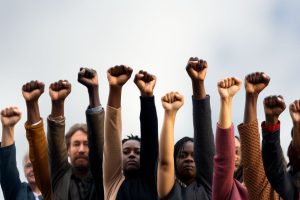Project 300 is Cape Town’s bold effort to hire 300 new safety officers while fixing old unfairness from the past. Thousands applied, showing how much people want a better future. The city made sure the hiring was fair, giving extra training when needed and making sure the new team reflects Cape Town’s diverse communities. Despite rumors, the project builds trust by opening doors and helping people grow, proving that fairness and hope can go hand in hand.
In South Africa, a heated debate is brewing over fair representation in jobs, sparked by Minister Gayton McKenzie’s job ad that favored certain racial groups. Many critics argue that this approach sidelines black candidates, while McKenzie defends his choices by highlighting the need for diverse representation in a country still healing from apartheid. His stance aims to correct past wrongs by ensuring that all races have a voice in government jobs. This struggle for balance between equity and merit showcases South Africa’s ongoing journey towards a truly inclusive society, where discussions about race and fairness remain vital for its future.
South Africa has taken a bold legal move against Israel for alleged war crimes, exhibiting its unwavering dedication to justice and democracy. This audacious undertaking mirrors Nelson Mandela’s principles and stands as a testament to the nation’s resilience and unwavering commitment to justice. South Africa’s case was both compelling and emotional, spotlighting the harsh reality of Gaza, where indiscriminate violence has led to the loss of thousands of civilian lives. Despite potential diplomatic repercussions, South Africa’s legacy of resisting oppression, giving voice to the voiceless, and upholding justice persists.
The Department of Employment and Labour, in partnership with the Commission for Conciliation Mediation and Arbitration (CCMA), recently concluded the 2023 National Employment Equity Roadshows in Cape Town. These roadshows, which began in July in Limpopo, aimed to increase awareness regarding the recent amendments to the Employment Equity (EE) Act of 1998 and its regulations, as well as sectorspecific EE numerical targets.
The Commission for Employment Equity (CEE) will present its 23rd Employment Equity Report at a media briefing held at the Emperor’s Palace Hotel in Kempton Park, Ekurhuleni. This report reflects the state of Employment Equity (EE) in South Africa’s labour market and will be handed over to the Minister of Employment and Labour, TW Nxesi, by the Commission Chairperson, Tabea Kabinde.
Despite the establishment of monitoring and reporting mechanisms for employment equity, the EEA’s impact has not achieved its intended goals after 25 years. The representation of previously disadvantaged individuals in senior management positions and specific industries remains inadequate, and corporate South Africa reflects the economically privileged population rather than the economically active one.
The South African Department of Employment and Labour is urging trade union federations to facilitate communication between groundlevel workers regarding the Employment Equity (EE) amendments and Affirmative Action. This call to action was made during a workshop aimed at empowering trade union representatives on their responsibilities as members of EE consultative forums.
South Africa’s Ministry of Employment and Labour is seeking public feedback on the Draft Employment Equity (EE) Regulations 2023. The proposed changes aim to establish sectorspecific EE targets to ensure the equitable representation of suitably qualified individuals from designated groups across various occupational levels in the workforce. This article outlines the key details of the proposed regulations and the opportunities for public input.
Embracing Equity: South Africa’s Journey Towards Equal Opportunities in the Workplace
South Africa has been committed to promoting equity in the workplace for more than two decades. The government’s efforts aim to foster equal opportunities and fair treatment for all. The Employment Equity (EE) Act plays a crucial role in this endeavor, as it works to eliminate unfair discrimination and promote affirmative action measures. The ultimate goal is to address historical imbalances and facilitate the equitable representation of designated groups, such as Black people, women, and persons with disabilities, at all levels of the workforce.
Employment and Labour Deputy Minister Boitumelo Moloi recently urged employers to adhere to the country’s labour laws. During a recent inspection by the Department of Employment and Labour’s team at Dasbosch Boerdery, the Deputy Minister emphasized the need for a cooperative approach to ensure employers comply with the law and avoid punitive measures from the inspectorate.










